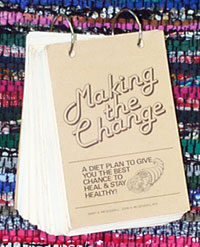Newsweek Magazine Warns about Modern Medicine
Newsweek Magazine Warns about Modern Medicine
Newsweek magazine’s August cover story, “The One Word that Can Save Your Life: No!,” by Sharon Begley is a summary article about the importance of avoiding common medical tests and treatments, the same ones I have been talking to you about for the past 30 years. I am saddened when I think of the lives ruined and lost because this information has been hidden from the public by my medical colleagues, largely for motives of profit. Please read this Newsweek article now.
Stay Out of the Medical Businesses
You and your family cannot win by being familiar with doctors, drugs, and hospitals. Just like you do not want to be on a first name basis with morticians, lawyers, auto mechanics, and plumbers, you do not want a doctor as a best friend or your calendar littered with appointments to visit these professionals. An undeniable fact is that the more you see doctors, the more likely you are to be tested and treated; for better or worse. The best way to stay out of the medical businesses is to be healthy. That means you must fix the primary cause of common diseases: the rich Western diet.
I have written a series of articles that will help you understand how to work with MDs, when unavoidable. If you get routine annual physical examinations, you are looking for trouble. There is unanimous agreement by major health policy-makers worldwide that these intrusive visits do more harm than good, especially when your doctor encourages you to take “early detection” tests, such as a PSA or mammogram for cancer prevention.
On those occasions where medical care is a necessity, you should see a doctor who offers general care. Most people have a primary care physician, but 20 to 25 percent use a specialist for primary care services. If you allow the specialist to take over your general care, you are putting yourself at risk. Consider that women who have a gynecologist as their primary care doctor are twice as likely to have a hysterectomy as women cared for by a general practitioner. Care of your general health is outside the expertise of a specialist; they rarely have the whole picture in mind. “Generalists,” “general practitioners,” “family practitioners,” “primary care” and “internal medicine doctors” are descriptive terms for the role of the doctor whom you should be seeing first and foremost, when absolutely necessary.
Finding the right doctor when you need one is well worth the hours required in the search. Your relationship with your doctor should be a partnership focused on improving the quality and quantity of your life. This requires comfortable communication and trust. In order to get the care and respect you deserve you must prepare before your doctor’s visit.
A medical specialist, such as a surgeon, cardiologist, or gastroenterologist, should serve only as a consultant to you and your general doctor. When additional knowledge or skills are needed, then an arrangement, a referral, is made to see the specialist. This expert then gathers information about you, comes to conclusions, and makes recommendations, and then sends a report back to your generalist. Together, the two of you then discuss this valuable information and decide on the next courses of action.
“No” is the operative word, as the title of this Newsweek article reads, to have on the tip of your tongue when you visit the doctor. I recommend that you arrive for your visit 10 minutes early and practice saying “No” while sitting in your car in the parking lot before entering the office. I have written many helpful articles easily found in my “Hot Topics” that will help you make decisions on what testing and treatments are of real value, and the alternatives. Before making decisions that could mean a lifetime of medication or taking a test that could lead to life-altering surgery, please consult my writings and let me offer you a challenging second opinion.
Below I have made some comments on major subjects addressed in this Newsweek article.
Avoid PSA (Prostate Cancer) Testing
According to Newsweek, “Dr. Stephen Smith, Professor emeritus of family medicine at Brown University School of Medicine, tells his physician not to order a PSA blood test for prostate cancer…” PSA is an abbreviation for prostate specific antigen, a substance measured in the blood. It is sold to men under the false pretense that detection of an elevation will lead to early detection of prostate cancer, which can then be removed early enough to delay or prevent death.
This Simple Blood Test is Harmful
Random population screening for prostate cancer with the PSA blood test results in 10 percent of men being found positive. Once cancer is suspected, the next procedure consists of a session of 12 needle biopsies of the prostate gland. The needles inserted during the biopsy damage nerves controlling an erection, and as a result, one month after surgery, 41 percent of men report erectile dysfunction (ED), and after six months the problem persists in 15 percent of men (permanent ED is caused just from the test to determine whether or not cancer is present). On average, from the biopsy, 30 percent of men will be found to have prostate cancer. (Microscopic prostate cancer is found in 8 percent of men in their twenties, 30 percent of men in their thirties, 50 percent of men in their fifties, and 80 percent of men in their seventies.) Almost all of these microscopic cancers are relatively benign (inactive) and would have never caused any future trouble if not detected. The real harm to the patient comes from the tests and treatments.
At best, one life is saved for every 1,400 PSA examinations performed. The costs are high, however, with 48 men being diagnosed with prostate cancer who would have otherwise never known they had this disease. The surgeries, radiation treatments, and drugs that follow a diagnosis can be expected to result in incontinence (men dribble in their pants, wear a diaper and/or live with an indwelling bladder catheter) and impotence (about 80 percent of men will have sexual dysfunction). All these sufferings are reasons that men diagnosed with prostate cancer have a 40 percent increase in suicide.
Early detection is a misnomer. By the time a prostate cancer becomes large enough to detect by PSA or digital rectal examination (about one centimeter in size), the cancer has been growing for an average of 10 years; and if it is the aggressive kind of cancer, it has already spread beyond the bounds for removal by radiation or surgery. Chemotherapies (including hormone treatments) have few benefits. Fortunately, most prostate cancers detected (more than 97 percent) are of the benign variety and never threaten a man’s life.
My advice is to never allow an “early detection” PSA or digital rectal exam to be performed on you. I believe the McDougall Diet will prevent, and even reverse, prostate cancer. So, without testing, how do you know if you have prostate cancer? Those very few men who develop the aggressive kind of prostate cancer will usually find their disease very late in life when it causes symptoms, such as urinary retention or bone pain. (The death rate from prostate cancer is very low, at 226 per 100,000 men older than 65 years.) Misleading men with hopes of “early detection” means the patient will simply know he is ill much longer, and as a result will be subjected to more painful and costly tests and treatments, not to mention the increased anxiety and worry.
Avoid Mammograms
According to Newsweek: “Dr. Rita Redberg, professor of medicine at the University of California, San Francisco, and editor of the prestigious Archives of Internal Medicine, has no intention of having a screening mammogram… they detect too many false positives (suspicious spots that turn out, upon biopsy, to be nothing) and tumors that might regress on their own, and there is little if any evidence that they save lives.”
Examinations of Your Breasts Are Harmful
The American Cancer Society once told women, “If you haven’t had a mammogram, you need more than your breasts examined.” Fortunately, after four decades of research, they now know better. Overall, 81 percent of women experience discomfort during mammography. As many as 46 percent of women classify that discomfort as pain, and 7 percent say the pain is severe. There is also the real possibility that compression of the breast tissue during the test may cause cancer cells to spread. Radiation from a mammogram may also induce breast cancer, especially in younger women.
More than half of all women following usual recommendations to have their breasts examined every other year will be found to have an abnormality that requires further testing and treatments. Between 1,400 and 2,500 women need to have a mammogram every other year for 10 years to save one life. Once diagnosed, the treatments are brutal, with deforming surgeries and radiation treatments, and sickening chemotherapies. Out of every 1,000 women tested, between 5 and 15 women will be “over-diagnosed.” In other words, without this intrusive testing she would have lived her entire life never knowing she was ill. The obvious result in these cases is mammograms needlessly destroyed the lives of women and their families.
Early detection is a misnomer. By the time a breast cancer becomes large enough to detect by a mammogram or breast self-examination (about one centimeter in size) the cancer has been growing for an average of 10 years, and if it is the aggressive kind it has already spread beyond the bounds for removal by radiation or surgery. Chemotherapies (including hormone treatments) are of small benefit (about the same as removing a woman’s ovaries).
My advice is to avoid screening mammograms and do not perform routine breast exams. You are just looking for trouble. Get on with your life. I believe the McDougall Diet will prevent, and even reverse, breast cancer. Those very few women who develop the aggressive kind of breast cancer will usually find their disease very late in life during a casual examination of their breasts or if it causes symptoms. Finding cancer early means living more years knowing you are ill, not living more years.
Avoid Colonoscopy Examinations
According to Newsweek, “At least 7,300 lives are saved every year thanks to colonoscopies.” However, what they did not tell you is that similar benefits can be obtained with one simpler and safer examination of the last two feet of your large intestine (a sigmoid examination) performed between ages 55 and 64. Benefits from polyp removal are largely confined to those lesions located in last part of the colon, within the reach of a sigmoidoscope.
Serious complications occur in an estimated 5 per 1,000 colonoscopies, an examination of the entire six feet of large intestine under anesthesia. One of the deadliest complications is perforation of the colon, which occurs in about 1 per 1,000 procedures. Consider that to prevent one death from colorectal cancer (the benefit), 1,250 people would need to have a colonoscopy. This is almost an even exchange: for one life saved from cancer, one life is lost (or at least seriously harmed) from a complication, like perforation.
My advice is to avoid colon cancer by eating the McDougall Diet. Colon cancer is rare, with only 2.5 cases in 100 people following the Western diet. To reduce this risk even further, especially for people with a lifetime of meat-eating, I recommend one sigmoid examination between ages 55 and 64. If this test is normal then do not have any further testing. If large polyps are found, then even after removal, further testing may be required.
Avoid Heart Tests and Surgeries
According to Newsweek, “At least five large, randomized controlled studies …found that the surgical procedures (angioplasties with or without stents) didn’t improve survival rates or quality of life more than noninvasive treatments including drugs (beta blockers, cholesterol-lowering statins, and aspirin), exercise, and a healthy diet.”
Heart Tests and Treatments Can Be Harmful
Simple heart tests like an EKG or treadmill stress test commonly pick up abnormalities that were never destined to become problems. Once detected, however, the patient enters “the business” and becomes a cardiac cripple—every pain between his knees and eyebrows is perceived as “the big one: a heart attack.” Further costly and dangerous tests and treatments follow the smallest imperfection. The gold standard for testing for most cardiac abnormalities is an invasive angiogram. An angiogram is a preoperative test with about two-thirds of patients going on to heart surgery (an angioplasty or bypass surgery).
Heart surgery fails because the surgeons operate on chronic, hard, fibrous plaques that rarely if ever kill. The dangerous plaques are small pustules that rupture and cause sudden closure of the heart artery. Surgery does nothing to prevent this sudden event that results in 100,000 to 200,000 heart attacks annually in the US alone.
My advice is to avoid heart disease (coronary artery disease) by eating the McDougall Diet. If you develop disease you can still reverse it with diet and judicious use of medications. Chest pains from partially blocked arteries are usually reduced or eliminated within a few days by following the diet. Refuse heart surgery (angioplasty or bypass) for chronic disease unless the intention is to relieve incapacitating symptoms (chest pains). Angioplasty is proven beyond any doubt to not save lives. Bypass surgery is little better. I also prescribe a baby aspirin and sufficient cholesterol-lowering statins to reduce the blood cholesterol levels below 150 mg/dL. (Angioplasty for acute cardiac events, such as a heart attack occurring within 90 minutes of the surgery, can be beneficial.)
Avoid Statins If You Are Otherwise Healthy
According to Newsweek: “Statins are proved to help people with both heart disease and high cholesterol, but not those with just high cholesterol. The drugs are nevertheless widely prescribed to patients who fit the latter description, despite adverse effects, such as severe muscle disease in up to 20 percent of patients.”
Statins Provide a False Sense of Security
Because of the enthusiastic and dishonest promotion of these high-profit drugs, many patients actually believe they are “cured” of their health problems; and as a result they may no longer see the need to make beneficial diet and lifestyle changes, which in truth, make a far greater difference than any medications.
The most serious adverse effect of taking these medications is damage to the muscles, called rhabdomyolysis, which can occasionally result in death. An estimated 1 to 5 percent of people on these medications experience significant muscle inflammation and pain. The more potent the statin, the greater the risk of muscle damage. With electron microscopy and biochemical tests, muscle cell damage is found in over 70 percent of people on statins, even when they had no complaints of pain.
My advice is to not take statins, even with a high cholesterol level, unless you have a very high risk of future troubles. Statins have been shown to reduce the risk of death (only a little) for patients who have had heart attacks, angioplasties, and/or bypass surgeries. However, for people with a lower risk of an impending heart tragedy (the average American with elevated blood cholesterol levels), cholesterol-lowering medications are so ineffective that benefits cannot be detected. Plus, any benefits present may be overshadowed by the harms caused by these drugs.
Recommended Articles

A Natural Cure for Depression

How Do I Gain Weight on the McDougall Diet? I’m Not Joking!






Join the Conversation!
Have a question, a helpful tip, or a story from your journey? Add it below - your voice matters.